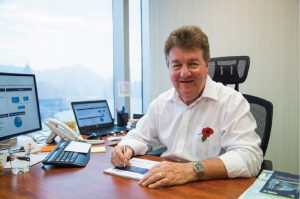E-Recycling brings full circle to waste management
- 2016-01-09
by Sharon Shi
After working on waste disposal projects in Hong Kong for 20 years, Nigel Mattravers left the city in 2000. Back then, plastic bags were handed out freely at local supermarkets.
Coming back three months ago, the waste manager has witnessed the changes in people's behaviour in their use of plastic.
Amazed by the transformation , Mr Mattravers, general manager at Alba Integrated Waste Solutions, is convinced that Hong Kong's response to electronic waste recycling will be just as positive.
Alba Integrated Waste Solutions Hong Kong, a joint-venture subsidiary of the Alba Group, plans to spend two years on building and another ten years operating an e-waste recycling system.
The German recycling company has been awarded a multimillion-dollar contract by the Hong Kong government to build and operate the first electronic waste recycling plant in the city.
The government will fund $548.6 million to construct the plant and an estimated $200 million a year to run the scheme.
Located on a three-hectare site in the EcoPark in Tuen Mun, the recycling plant will deal with the waste from electrical and electronic equipments including computers, televisions, monitors, refrigerators, washing machines and air conditioners.

The recycling scheme introduces a circular economy to the Hong Kong market, forming a dynamic process between manufacture and consumption.
The new model is an attempt to replace the old linear chain that starts from excavation to production, consumption and ending in landfill.
"The recycling scheme aims to convert 85 per cent of the waste into secondary raw materials, such as plastics and alumina", Mr Mattravers said.
"The company will also offer door-to-door service since some equipments can be difficult to move", he added.
A spokeswoman for the Environmental Protection Department said the government aimed to apply the "polluters pay" principle by charging a recycling levy on suppliers of regulated electrical equipment.
She said registered suppliers may then transfer the cost of of levies wholly or partially on to other stakeholders along the supply chain, including distributors, retailers and consumers, thus pushing up the prices.
The recycling fees has not yet been determined but the government indicatively estimates a cost of $100 for smaller items and $200 to $250 for bulky appliances, according to the Environmental Protection Department.
Tourists, who make purchase from retailers in Hong Kong but for the usage outside the city, will also be charged under the scheme.
Consumers will have the legal responsibilities to take back the appliances to regional collection centres and satellite stations set up by Alba Group at the end of cycle.
"Incorporating the cost of recycling into the retail price will encourage consumers to rethink over their consumption habits," said Project officer of Friends of the Earth Wendell Chan.
He said the fee to handle the waste was often higher than the cost to produce a brand new item.
Producers should have a bigger share of responsibility since they are involved in most of the product's lifecycle from design, engineering, marketing and shipping but missing a part in disposal, he said.
"By making producers responsible for the disposal of their products, they will need to design their products in a way to maximize reuse and recyclability and also minimize waste for easier dismantling and recovery," Mr Chan said.
"Shopper may not be happy about [being charged] at a higher price," Chairman of Panel on Financial Affairs Ng Leung-sing said. "Spending a huge amount of money in the e-waste recycling plan shows that Hong Kong is willing to take the responsibility."
On the other side of the world, "Advance Recycling Fee" method adopted in Europe, Korea and Taiwan is funded collectively by manufacturers, importers, wholesalers and retailers. Consumers only need to return the items for recycling.
Valuing at tax to the products in different levels, the government should be careful with the scheme since manufacturers can learn to game the systems, said David Ahlstrom, professor of the Business School at the Chinese University of Hong Kong.
Electronic waste recycling business may also form a monopoly because of the high fixed costs of the facilities, he said.
"Hong Kong government should be open to better methods coming along in the next few years by giving opportunities to small companies to experiment with different models and standards," Mr Ahlstrom said.
Hong Kong generates around 70,000 tonnes of e-waste every year, mostly exported to developing countries with lower environmental standards or primitive recycling practices to handle valuable materials, according to Friends of the Earth.
(Edited by Tina Cheung.)
《The Young Reporter》
The Young Reporter (TYR) started as a newspaper in 1969. Today, it is published across multiple media platforms and updated constantly to bring the latest news and analyses to its readers.

Controversies behind ambitious Lantau plan

Is Hong Kong ready for street art?




Comments